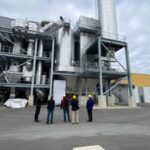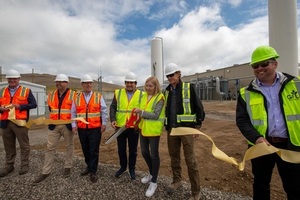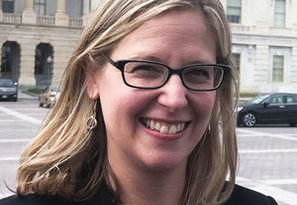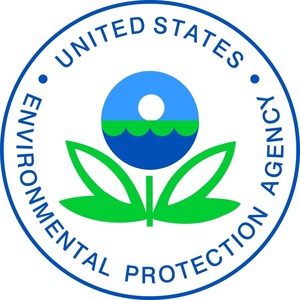SUNY Cobleskill’s biomass gasifier wins NSF grant
Energy Disrupter
ADVERTISEMENT
SUNY Cobleskill’s rotary gasifier is moving into a new development phase with award funding through a National Science Foundation Small Business Technology Transfer grant totaling $255,879. The award was given jointly to SUNY Cobleskill, the Research Foundation for SUNY, and industry partner Caribou Biofuels, Inc. for the continued development and commercialization of the inclined rotary gasifier technology that turns waste streams into biofuels, biopower, and soil supplements.
This is SUNY Cobleskill’s first grant award through the NSF and comes through America’s Seed Fund, a project supporting research and development of deep technologies based on discoveries in fundamental science and engineering. Funding support will ensure that the gasifier can be deployed anywhere globally and validate that the emissions from the gasifier are entirely neutral to environmental impact.
The patented gasifier technology, invented at SUNY Cobleskill by Professor David Waage, is a fully automated, portable waste-to-energy system. The unit’s mobility allows it to be deployed directly to forests, farms, water treatment facilities, and other areas of biomass. From almost any combustible material it produces both gaseous and liquid fuels that are significantly higher in energy content than other similar gasification technologies. The fuels burn markedly cleaner than fossil fuels while reducing overall carbon emissions. The machine built at SUNY Cobleskill can produce 60 kilowatts of power a day from approximately two tons of feedstock, enough to power about 50 standard American homes.
Initial research was funded by a joint Environmental Protection Agency (EPA) and Department of Defense (DOD) grant of $1.6 million. SUNY Cobleskill received an additional $5.8 million grant in 2020 from the California Department of Forestry and Fire Protection (CAL FIRE) to deploy a mobile unit to complement the state’s efforts to reduce wildfires by clearing forests of fallen trees and undergrowth.
“The gasifier technology is answering calls from the G7 and United Nations for advancement toward a sustainable global environment supported, in part, by alternative sources of clean energy,” said Marion Terenzio, president of SUNY Cobleskill. “With the support of the National Science Foundation and its interest in the possibilities the gasifier represents, the technology is a step closer to reaching the market and having the ecological impact that our talented team has set out to achieve.”
“There is tremendous potential for the gasifier in domestic and community use,” said SUNY Research Foundation President Jeff Cheek. “The economics of this environmentally-friendly system, coupled with the ability to input very wet material without pre-sorting, is truly unparalleled. Including this gasifier as part of a company’s energy strategy will provide a real impact to our environment. We are thrilled to have such an amazing partner in Caribou Biofuels to deploy this system in New York and create jobs for the Mohawk Valley.”
“NSF is proud to support the technology of the future by thinking beyond incremental developments and funding the most creative, impactful ideas across all markets and areas of science and engineering,” said Andrea Belz, division director of the Division of Industrial Innovation and Partnerships at NSF. “With the support of our research funds, any deep technology startup or small business can guide basic science into meaningful solutions that address tremendous needs.”
“This funding from the NSF comes at a critical stage as we refine the process of sequestering carbon from the environment and transforming it into clean, green fuels,” said Kieran Mitchell, founder of Caribou Biofuels. “We are now validating and testing our prototype technology to create a full-scale demonstration model early next year and, from there, deployed commercially. Caribou values our close relationships with SUNY Cobleskill and the Research Foundation for SUNY and, through combined expertise, we’re drawing a new inroad toward a carbon-neutral future.”
Research at SUNY produces nearly 300 new technologies a year. The SUNY Research Foundation protects the valuable intellectual property generated at SUNY campuses and works with industry and businesses, like Caribou Biofuels, to translate research discoveries into commercial products that benefit society and spur economic development. All proposals submitted to the NSF SBIR/STTR program, also known as America’s Seed Fund powered by NSF, undergo a rigorous merit-based review process. To learn more about America’s Seed Fund powered by NSF, visit seedfund.nsf.gov.
















